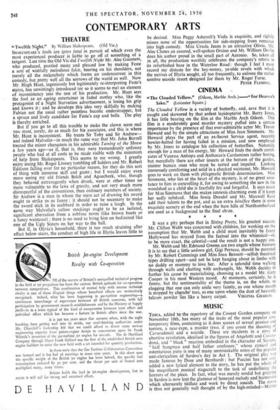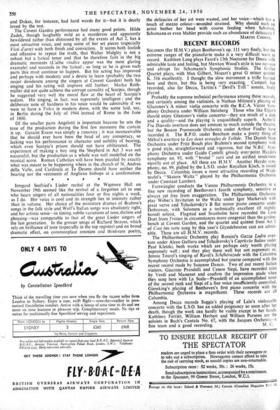MUSIC TOSCA, added tcy the repertory of the Covent Garden
company on November 18th, has many of the traits of the most popular con- temporary films, containing as it does scenes of sexual passion and torture, a near-rape, a murder (two, if you count the shooting of Cavaradossi) and a suicide. These are incidents in a story of abortive revolution, idealised in the figures of Angelotti and Cavara- dossi, and " black " reaction embodied in the character of Scarp, "half hangman and half father confessor," whose cynical and ostentatious piety is one of many unmistakable notes of the popular anti-clericalism of Sardou's day in Act 1. The original play was made famous by Duse and Bernhardt ; but Puccini has not only added a new lyrical element to the story, he has put the whole Of his magnificent musical stagecraft to the task of underlining the horrors of the piece. In fact, what was merely sordid but gripping in Sardou is now lent the glamour of honeyed melody and harmonies which alternately titillate and work by direct assault. The opera is thus not generally well thought of by the high-minded—Mahler and Dukas, for instance, had hard words for it—but it is dearly loved by the rest. The Covent Garden performance had many good points. Hi1de Zadek, though laughably mild as a murderess and apparently bewildered rather than distressed by all the events of Act 2, has a most attractive voice, and sang some of her set pieces (especially Vissi d'arte) with both finish and conviction. It seems both foolish and offensive to repeat the truth, that Walter Midgley is not a robust but a lyrical tenor and that he therefore fails in the big dramatic moments (L'alba vindice appar was the most glaring example) and succeeds in the lyrical ; so long as he is given such parts this must continue to happen. But his acting has improved' and perhaps with modesty and a desire to learn (probably the two major desiderata among the singers at Covent Garden) both his singing and his acting will improve still further. Marko Roth- mutter did not quite achieve the corrupt carnality of Scarpia, though he suggested very well the moral flaw at the heart of Scarpia's sadism. His singing, in fact, was supremely intelligent ; and the deliberate note of hardness in his voice would be admirable if we were to have a Tacit in modern dress, with the scene laid, say, in Berlin during the July of 1944 instead of Rome in the June of 1800.
Of the smaller parts Angelotti is important because he sets the tone of the production during the first few moments the curtain is up. Geraint Evans was simply a runaway ; it was inconceivable that he should ever have been the head of any conspiracy, so lacking was his performance in character and nobility of bearing, which even Scarpia's prison should not have obliterated. The experiment of making a boy sing the Shepherd in Act 3 was not successful, but the production as a whole was well modelled on the musical score. Roman Catholics will have been puzzled by exactly what was meant to be happening where in the church of St. Andrea della Valle, and Cardinals at Te Deums should have neither the bearing nor the vestments of Anglican bishops at a confirmation.
Irmgard Seefried's Lieder recital at the Wigmore Hall on November 19th seemed like the revival of a forgotten art to one who hears singers of all nationalities four or five nights a week, as I do. Her voice is cool and its strength lies in intensity .rather than in volume. Her choice of the miniature dramas of Brahms's songs in the folk style and Wolfs Italian songs was absolutely right, and her artistic sense—in timing, subtle variations of tone, diction and phrasing—was comparable to that of the great Lieder singers of the last generation. In the grosser songs of Richard Strauss, which rely on brilliance of tone (especially in the top register) and on broad dramatic effect, on commonplace emotion and third-rate poetry,
the delicacies, of her art were wasted, and her voice—which has a touch of mezzo colour—sounded strained. Why should such an artist bother her head with coarse feeding when- Schubert, MARTIN Schumann or even Mahler provide such an abundance ofof dceoolicapcEiRe.s ?















































































 Previous page
Previous page